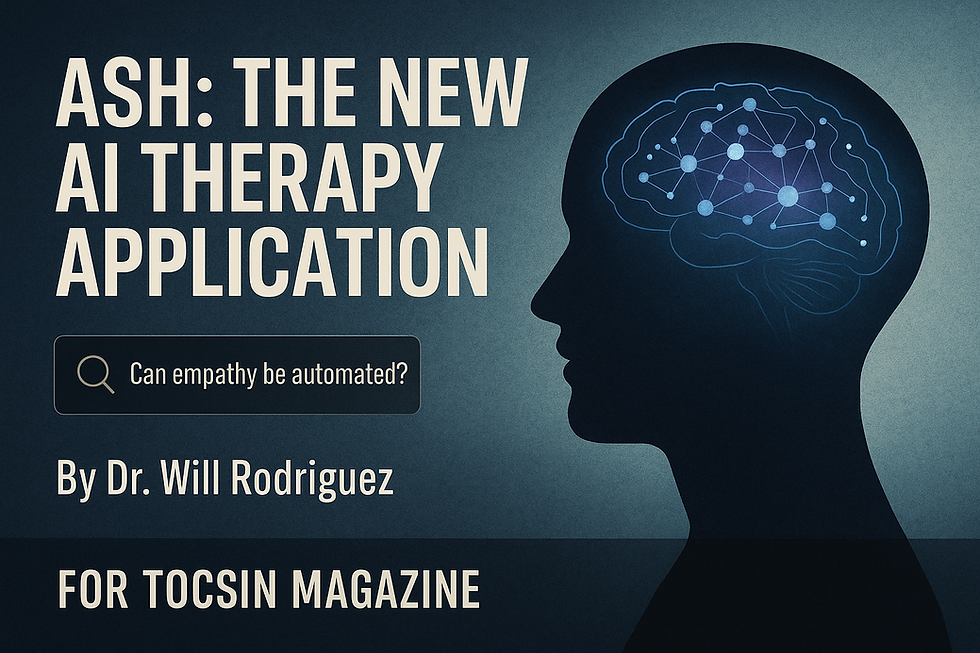Ash: The New AI Therapy Application - A Community Guide
- Dr. Wil Rodriguez

- Jul 26, 2025
- 3 min read
By Dr. Wil Rodriguez
TOCSIN Magazine

What is Ash and Why is it Generating So Much Interest?
Ash is a mental health application developed by Slingshot AI that officially launched to the public in July 2025. The app presents itself as “the first AI designed for therapy” and offers support for stress, anxiety, relationships, or difficult days in a private, judgment-free space. After 18 months of development and testing with 50,000 beta users, the application is now available for free on iOS and Android.
How Does Ash Work?
Ash is trained with the best of psychology, using the world’s largest and most diverse dataset of real human therapy, and has been fine-tuned by a clinical team and advisory board of leading global mental health experts. The application is designed for long-term growth, learning from user patterns and building a personalized program.
What Ash IS Good For
Immediate and Accessible Support: The app can provide 24/7 support, which is especially valuable considering the shortage of mental health professionals and long waiting lists.
Safe Space for Expression: It offers a private environment where people can speak freely about their thoughts and feelings without fear of judgment.
Complementary Support: It can serve as a complementary tool between traditional therapy sessions or as a first step for those hesitant to seek professional help.
Pattern Tracking: The app can help identify patterns in mood and behavior that could be useful for self-awareness.
What Ash is NOT For - Important Limitations
NOT a Replacement for Professional Treatment: Ash cannot replace therapy with a licensed psychologist, psychiatrist, or counselor, especially in cases of serious mental health disorders.
NOT for Mental Health Crises: While Ash is designed to redirect users in crisis toward human professionals, it should not be used as a first-line response in mental health emergency situations.
CANNOT Prescribe Medications: Only licensed mental health professionals can evaluate, diagnose, and prescribe pharmacological treatments.
DOES NOT Offer Clinical Diagnoses: AI cannot provide official diagnoses of mental health disorders.
Ethical and Safety Considerations
Data Privacy: Psychologists have expressed common concerns about AI therapy, including data privacy, confidentiality, and how effectively therapy bots can handle risk.
Marketing and Retention: There are concerns about the marketing and retention techniques these applications use, and how this might affect the therapeutic relationship.
Technology Dependence: There’s a risk that users may develop excessive dependence on AI instead of seeking real human connections and professional support when necessary.
Recommendations for Responsible Use
Use as Complement, Not Replacement: Consider Ash as an additional support tool, not as a substitute for professional therapy.
Seek Professional Help When Necessary: If you experience thoughts of self-harm, severe depression symptoms, severe anxiety, or any mental health crisis, seek immediate help from a professional.
Maintain Realistic Expectations: Remember that you’re interacting with artificial intelligence, not a human therapist with years of training and clinical experience.
Protect Your Privacy: Carefully read the terms of service and privacy policies before sharing sensitive personal information.
Combine with Other Strategies: Use it alongside other wellness practices like exercise, meditation, real social connections, and when appropriate, professional therapy.
Conclusion
Ash represents an interesting advancement in democratizing mental health support, making a certain level of help available to anyone with a smartphone. However, it’s crucial to understand that this is a support tool, not a replacement for professional mental health care.
Technology can be a valuable bridge to wellness, especially for those without immediate access to traditional services, but human supervision and judgment remain irreplaceable in the mental health field. As a community, we must embrace these innovations with cautious optimism, leveraging their benefits while maintaining the fundamental importance of human expertise in mental health care.
Remember: Ash is an AI, not a psychologist. It’s designed to support, not to replace professional mental health treatment.
Reflection Box
In a world increasingly drawn to instant solutions and digital convenience, Ash poses a provocative question: Can empathy be automated? While it may never replicate the depth of human presence, Ash undeniably reflects our collective yearning for support, understanding, and connection. This tool is not just about artificial intelligence—it’s about emotional accessibility in an overstimulated, underserved world.
As we walk alongside technology, perhaps the real task is to remember that vulnerability is not a flaw to optimize, but a human gift to be held in care. Whether it’s Ash or any other AI tool, the measure of its success won’t be in lines of code—but in how deeply it invites us back to ourselves.
For more reflections at the intersection of psychology, technology, and human meaning, visit TOCSIN Magazine and join the conversation.
By Dr. Will Rodriguez
For TOCSIN Magazine







Comments